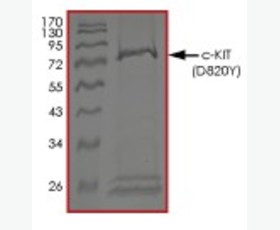Recombinant Human S100A16
| Product name: | Recombinant Human S100A16 |
| Source: | E. coli |
| Purity: | Greater than 95% as determined by reducing SDS-PAGE. |
| Buffer Formulation: | Lyophilized from a 0.2 μm filtered solution of 20mM Tris, 500mM NaCl, pH8.0. |
| Applications: | Applications:SDS-PAGE; WB; ELISA; IP. |
| Storage: | Avoid repeated freeze/thaw cycles. Store at 2-8 oC for one month. Aliquot and store at -80 oC for 12 months. |
| UOM: | 100ug/50ug/200ug/1mg/1g |
| Source | E. coli |
| Description | Recombinant Human Protein S100-A16 is produced by our E.coli expression system and the target gene encoding Met1-Ser103 is expressed. |
| Names | Protein S100-A16; Aging-associated gene 13 protein; Protein S100-F; S100 calcium-binding protein A16; S100A16; S100F; AAG13 |
| Accession # | Q96FQ6 |
| Formulation | Lyophilized from a 0.2 μm filtered solution of 20mM Tris, 500mM NaCl, pH8.0. |
| Shipping |
The product is shipped at ambient temperature. |
| Reconstitution |
Always centrifuge tubes before opening. Do not mix by vortex or pipetting. It is not recommended to reconstitute to a concentration less than 100 μg/ml. Dissolve the lyophilized protein in ddH2O. Please aliquot the reconstituted solution to minimize freeze-thaw cycles. |
| Storage |
Lyophilized protein should be stored at < -20°C, though stable at room temperature for 3 weeks. Reconstituted protein solution can be stored at 4-7°C for 2-7 days. Aliquots of reconstituted samples are stable at < -20°C for 3 months. |
| Purity |
Greater than 95% as determined by reducing SDS-PAGE. |
| Endotoxin | Less than 0.1 ng/µg (1 IEU/µg) as determined by LAL test. |
| Amino Acid Sequence |
MSDCYTELEKAVIVLVENFYKYVSKYSLVKNKISKSSFREMLQKELNHMLSDTGNRKAADKLIQN LDANHDGRISFDEYWTLIGGITGPIAKLIHEQEQQSSS
|
| Background | S100A16 is a member of S100 protein superfamily that carries calcium-binding EF-handmotifs. S100 proteins are cell-and tissue-specific and are involved in many intra-and extracellular processes hrough interacting with specific target proteins. S100A16 expression was found to be astrocyte-specific. The S100A16 protein was found to accumulate within nucleoli and to translocate to the cytoplasm in response to Ca(2+) stimulation. The homodimeric structure of human S100A16 in the apo state has been obtained both in the solid state and insolution, resulting in good agreement between the structures with the exception of two loop regions. The homodimeric solution structure of human S100A16 was also calculated in the calcium(II)-bound form. Immunoprecipitation analysis revealed that S100A16 could physically interact with tumor suppress or protein p53, also a known inhibitor of adipogenesis. Overexpression or RNA interference-initiated reduction of S100A16 led to the inhibition or activation of the expression of p53-responsivegenes, respectively. S100A16 protein is a novel adipogenesis-promoting factor. |














